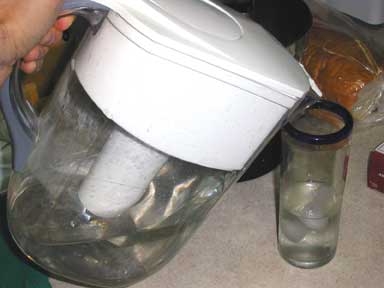What kind of water filters are available and which one is right for me?
In recent years the market has been flooded with all sorts of drinking water filters, from whole house systems to those that fit directly on your tap, to portable pitchers that fit on the shelf in your refrigerator. Filters can treat contaminants, or just improve taste. No single filter will remove all types of contaminants and most filters are very specific in what they will effectively remove.
 First,
ask yourself if a water filter is necessary.
First,
ask yourself if a water filter is necessary.
If you have a private well, have the water tested annually. Although this may seem expensive, it is still usually less expensive than paying a monthly water bill, and certainly less expensive than becoming ill from contaminated water. If your water is from a public system you should receive a list of contaminants and their levels in the Consumer Confidence Report that is included along with your monthly water bill. If tests do not reveal any contaminants you probably do not need a filter unless you wish to treat for taste.
If you do choose to get a water filterů
If you know you have a certain contaminant or your water has compromised taste, you should know how the different water filter systems work before purchasing one. Treatment systems usually use one or a combination of these five basic categories: disinfection methods, filtration, reverse osmosis, distillation, ion exchange. For more information on what contaminants each type of system will remove see our "Buying Home Water Treatment Equipment" WQ-6 publication. The following additional publications will give you more specific facts about each filter system or contaminant.
- Sulfur Water Control WQ-11
- Distillation For Home Water Treatment WQ-12
- Home Water Treatment Using Activated Carbon WQ-13
- Reverse Osmosis for Home Treatment of Drinking Water WQ-14
- Bacterial Contamination of Household Water WQ-15
- Cryptosporidium: A Waterborn Pathogen WQ-23
- Lead in Drinking Water WQ-26 (pdf only)
- Nitrate and Indiana's Ground Water WQ-27 (pdf only)
One note of caution regarding water filters: Make sure you follow the manufacturer's
guidelines for replacing the filter. A neglected water filter system can
compromise your health, through build up of bacteria, more than not using
a filter at all.
Well Disinfection
If your well tests positive for bacteria, one recommended
solution is to shock chlorinate the well and plumbing systems.
Follow this informative guide on well disinfection
from IDEM.